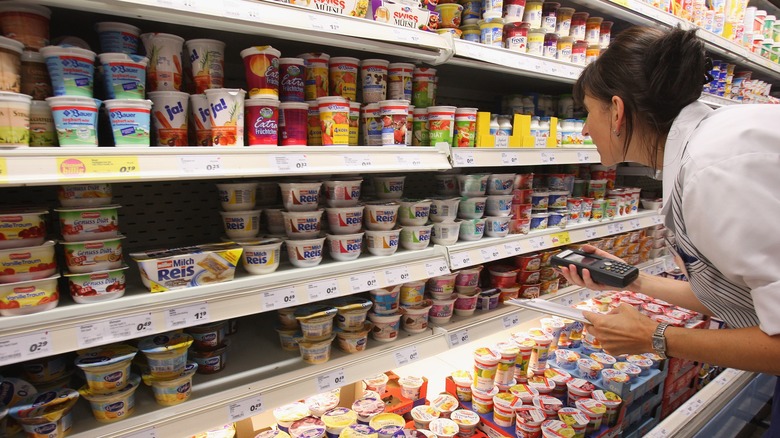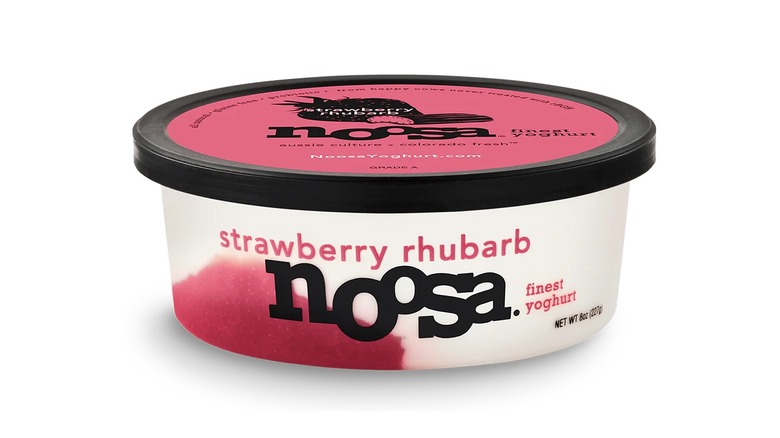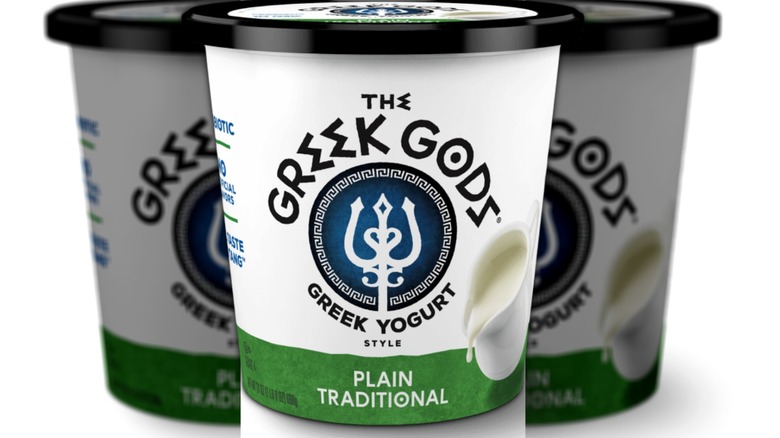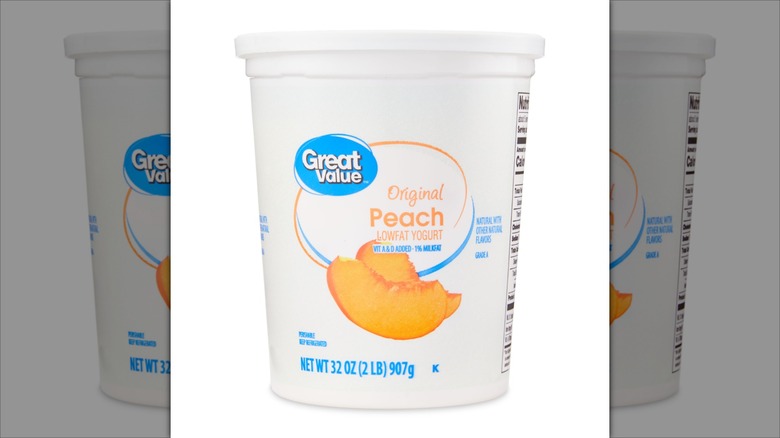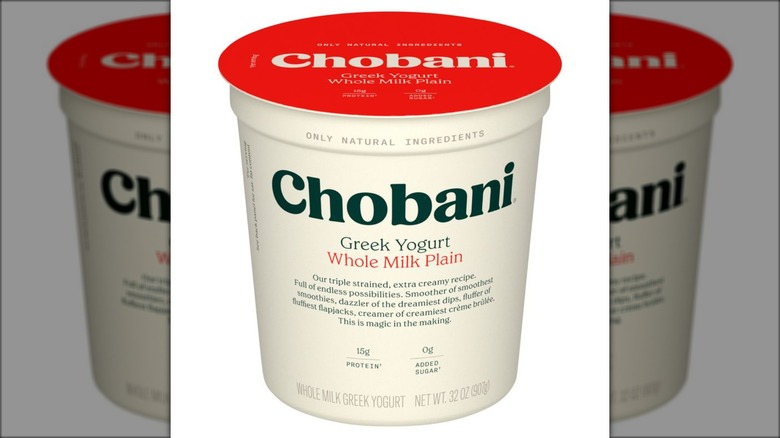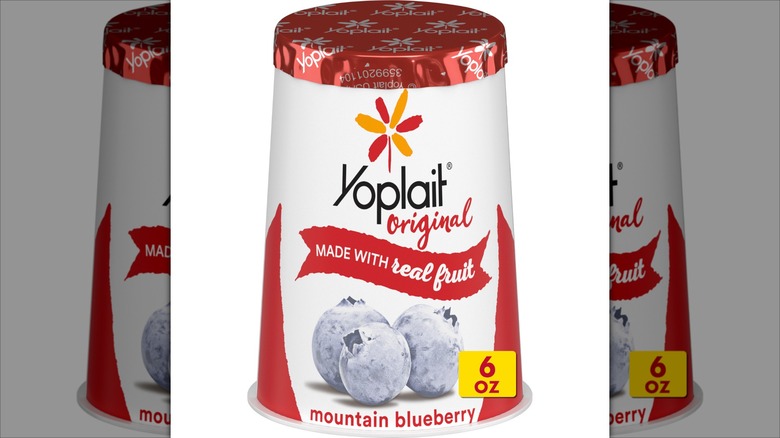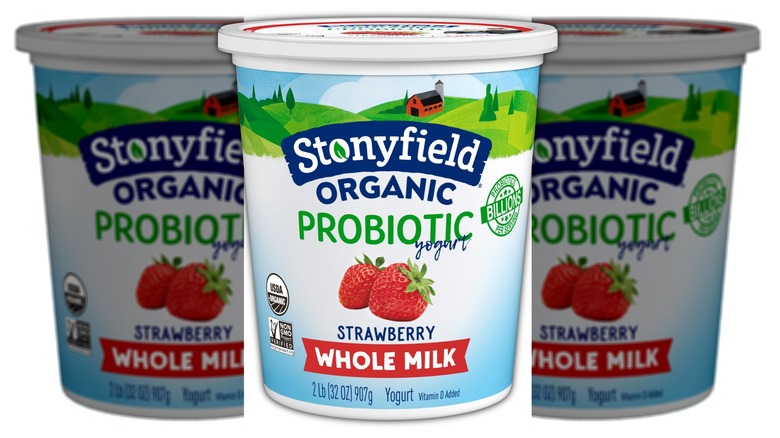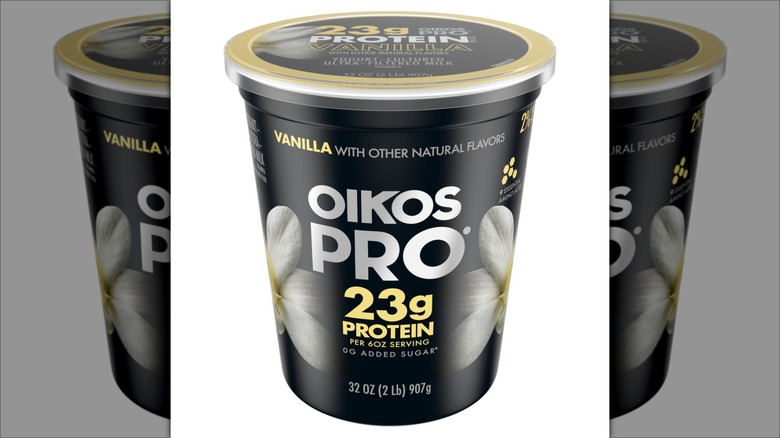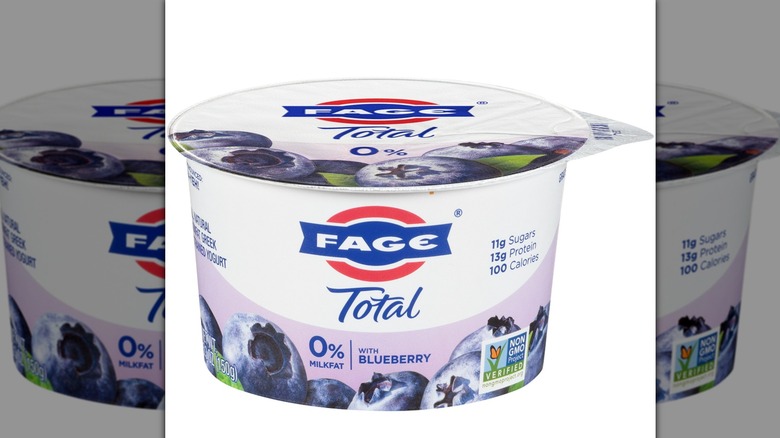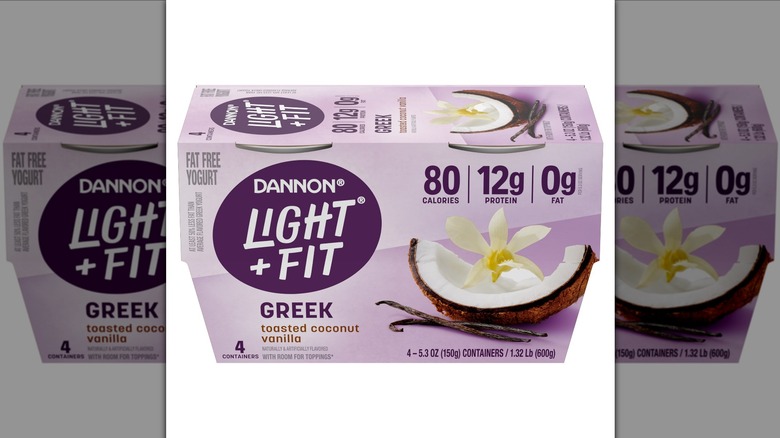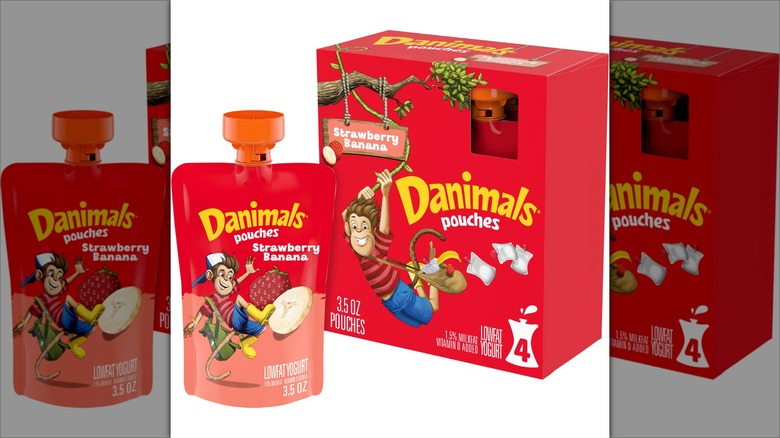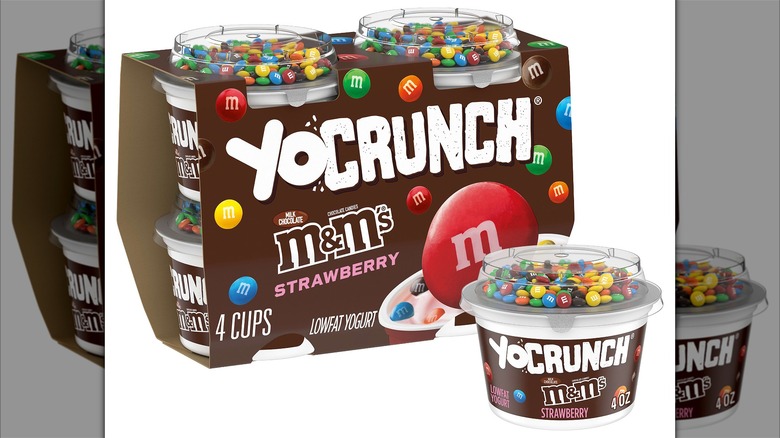Store-Bought Yogurt Brands Made With The Highest And Lowest Quality Ingredients, According To A Nutritionist
We may receive a commission on purchases made from links.
Looking for store-bought yogurt brands, it's easy to lose track of which options are most nutritious and end up snagging the ones that simply taste good.
While we aren't against a delicious-tasting yogurt, there's a bit more to the story when it comes to selecting the right pick. That's why we've consulted Lisa Richards, a certified nutrition coach and creator of The Candida Diet, to help you determine which yogurt selections are worth your buck and which you should leave sitting on shelf. She has set guidelines about the ingredients you'll want to avoid when you're selecting a yogurt brand, and how much protein or sugar should be present in a serving.
From added sugar to Vitamin D, you might be surprised at how much there is to consider about the most popular yogurt brands on the market today. So let's explore which yogurt brands are made with the highest- and lowest-quality ingredients, according to a nutritionist.
Low: Noosa
Noosa yogurt is a tough one to categorize. According to Lisa Richards, a good yogurt will contain probiotics and all-natural ingredients. And while Noosa meets these requirements, there is one area in which this brand doesn't shine — and that's in the category of sugar.
Before we dive into the details, we first want to define what we mean by "sugar" versus "added sugar." Almost every yogurt will contain sugar of some sort, as this type of sugar is naturally occurring in milk. Added sugar, however, is sugar that is added to food and is not naturally occurring. Plain yogurt tends to be free of added sugar, making it the preferable choice. "Plain yogurts have no added sugars and can be sweetened naturally with fresh fruit or honey if needed, " explains Richards.
Sadly, most Noosa yogurts come flavored and are jam-packed with added sugar. With options such as strawberry rhubarb, key lime, pumpkin, raspberry, and tart cherry, bypassing this brand in the grocery aisle may not be easy. Nevertheless, according to Richards, yogurt should not exceed 10 grams of sugar per serving. "Many yogurts have added sugars which can contribute to obesity, diabetes, and other health issues," she explains. Thus, at a total of 31 grams of sugar in the strawberry rhubarb flavor and 34 grams of total sugar in the key lime flavor, we can't recommend this yogurt brand in good conscience — at least, not as it relates to this yogurt's sugar-laden ingredients.
High: Greek Gods
Like many other brands on this list, Greek Gods yogurt certainly has plenty of sugar-infused Greek yogurt flavors out there, many of which exceed the 10-gram total recommendation that Lisa Richards has put forth. We get that. Still, Greek Gods has a couple of readily available plain versions, including plain traditional and plain nonfat, that we think are worth noting.
As mentioned before, Lisa Richards, CNC, recommends that yogurt contains all-natural ingredients. "Natural ingredients are generally healthier and free from potentially harmful additives," she states. In addition, probiotics in yogurt are always ideal. "Probiotics are beneficial for digestive health and can boost the immune system," Richards tells us. Fortunately, Greek Gods yogurt isn't only all-natural but also contains probiotics, more than seven active cultures, and 6 grams of protein per serving. It's also made with rBGH and rBST-free milk and no artificial colors or flavors, making this brand the bees-knees if you're looking for plain yogurt with all the best health benefits.
If you must pick up a tub of Greek Gods yogurt flavored varieties, be careful. The company advertises its products as sweetened with honey, and while honey is present on the ingredients list, there's also plenty of cane sugar that raises sugar totals well above the expert-recommended 10 grams per serving.
Low: Great Value
Yogurt ingredients should be simple. Unfortunately, Walmart's Great Value brand didn't seem to get the memo. Looking at Great Value's peach-flavored low-fat yogurt label, we were a little bummed to see additives we don't normally see in high-quality yogurts. According to Lisa Richards, minimal is the way to go when it comes to ingredients. And though we aren't seeing artificial colors or flavors here, we're still concerned about the use of bioengineered ingredients along with add-ins like carrageenan, modified food starch, and sodium citrate.
Also, be aware that Great Value low-fat yogurt contains quite a bit of sugar, which isn't surprising given the fact that there are many store-bought low-fat yogurt options that aren't exactly as healthy as you think. In this yogurt, you'll find a total of 21 grams of sugar per ¾ cup serving in the peach variety and 19 grams of total sugar per ⅔ cup serving for the Greek vanilla. While this might not be a terrible choice given its price point, it certainly isn't the best, especially when it comes to sugar and additives.
High: Chobani
Anybody who knows good yogurt knows that Chobani yogurt can get downright dreamy, especially where texture is concerned. But are the ingredients worth the purchase? According to the guidelines set forth by nutritionist Lisa Richards, it appears so.
First and foremost, Chobani flavored varieties tend to be all over the place when it comes to added sugar, with some varieties containing loads of sugar, while other varieties such as plain (great for recipes containing Greek yogurt) and zero sugar contain little to no sugar at all. Chobani yogurt also features non-GMO ingredients along with up to 11 grams or more of protein per serving, according to the nutrition information on most labels we've seen. As with most yogurts on this list, Chobani also features live and active cultures, making it a great choice for your digestive health and immune system, according to Richards.
Despite the many benefits of eating Chobani yogurt, there are a few things we'd like to mention. There are several gums listed in the ingredients list of Chobani yogurt, particularly when it comes to flavored varieties. Certain gums, like guar gum, sometimes have a reputation for causing stomach discomfort and digestive distress in some people, but can also prove beneficial for gut health in others. Thankfully, the plain low-fat, nonfat, and whole milk versions contain only cultured milk, so there's no reason you shouldn't be able to enjoy the rich, decadent, smooth richness of Chobani without any regrets in regards to health.
Low: Yoplait
It's safe to say that Yoplait dominates the yogurt market as far as mainstream yogurt goes, but that isn't to say that the company features the highest-quality ingredients. Yoplait offers its original yogurt options geared towards adults, its kid-friendly option in the form of squeeze tube Go-Gurt, and its seemingly high-end yogurt offerings known as Oui. Upon examining each yogurt type from the brand, however, it became apparent to us that none of these options stands out in terms of healthy ingredients.
Taking the Original Mountain Blueberry Yoplait yogurt for example, we found additives like cornstarch and gelatin on the ingredients list. And while these may not harm your body per se, they also aren't a part of the minimal ingredients lists Lisa Richards has recommended we look for when purchasing store-bought yogurt. In addition, Go-Gurt offers kids a healthy dose of various types of starches, along with gelatin and plenty of added sugar, compounding the reasons we'd recommend you pass on Yoplait branded yogurts. Lastly, Oui, though sophisticated in overall presentation, still features plenty of sugar, cornstarch, and "gums," meaning it too doesn't quite meet the requirements for ingredients in yogurt that are suggested by our expert.
High: Stonyfield
Given guidelines as set forth by Lisa Richards, we were eager to compare the ingredients of Stonyfield Organic Yogurt against her recommendations to see how the brand fared. Thankfully, Stonyfield Yogurt fits the bill as far as quality goes, offering plenty of protein, probiotics, and organic ingredients to make it well worth your purchase.
Though Stonyfield Yogurt offers a tremendously high-quality plain yogurt featuring organic milk and Vitamin D3, it also offers flavored variety that boasts of similar benefits. Flavors like Stonyfield Strawberry still come with 6 grams of protein per ¾ cup and "billions" of probiotics, as purported on the label. Each flavor is indeed organic, and ingredient lists remain minimal without artificial ingredients, starches, gums, and the like.
One thing we will mention is that though we're pretty impressed by Stonyfield's ingredients, the flavored varieties are slightly high in sugar. With the strawberry flavor being over 10 grams of sugar, it does exceed Richard's recommendation of only 10 grams per serving. Still, we'll admit, it isn't too far off. All in all, we think Stonyfield lives up to its reputation for being an all-star yogurt brand, and for that reason, we think it's a brand worthy of checking out.
Low: Oikos
Oikos yogurt certainly stands out from the crowd, offering a variety of benefits not always seen from other brands. To start, Oikos offers a high amount of protein per serving. In its Triple Zero variety, you can expect to get 15 grams of protein per yogurt cup. According to Lisa Richards, 5 to 10 grams is the goal, given that the added protein packs plenty of benefits. As Richards puts it, "Protein helps with satiety, muscle repair, and overall nutrition." Additionally, Oikos has a line of yogurt called Oikos Pro that boasts 20 grams of protein per serving.
Not only does Oikos reign supreme in the protein department, but it tends to do well in terms of added sugar, also. The Triple Zero variety features low amounts of sugar, as does Oikos Pro. Still, expect "regular" Oikos varieties, like Oikos Strawberry, to contain more than 10 grams of sugar, along with not-so-minimal ingredients such as whey protein concentrate, tapioca starch, and potassium sorbate to ensure freshness.
Because of the added ingredients, we're going to have to pass on Oikos when it comes to high quality. As Richards indicates, yogurt should contain minimal ingredients whenever possible.
High: Fage
If you're looking for a high-quality yogurt, Fage is an excellent brand to try out. Coming in both flavored and plain varieties, each packs a good amount of protein at about 13 grams in a single cup of the blueberry flavor, and 17 grams in a ¾ cup serving of the plain. As for additives, there aren't many, given that the even the Fage flavored varieties feature only cornstarch and pectin as opposed to gums, artificial colors, and the like. As usual, we recommend you go for plain Fage over the flavored sort, since the flavored variety often contains over the 10 grams of sugar limit recommended by Lisa Richards.
Concerning the plain version of Fage, expect to get nothing but milk and cream along with those good-for-you live and active cultures Richards recommends you look for in yogurt. Overall, Fage yogurt proves to be a winner in terms of minimal additives and a healthy dose of protein.
Low: Dannon
When it comes to the guidelines set forth by Lisa Richards, Dannon isn't going to be a brand with high-quality yogurt. Despite being a popular household name, Dannon fails to impress not only in terms of its flavored yogurt varieties, but in regards to plain yogurt as well.
Dannon has several yogurt offerings in stores, including its Light + Fit and plain varieties. Starting with Light + Fit, expect to get a hefty dose of protein per serving (approximately 12 grams per yogurt cup) and lower sugar hovering at about 7 to 8 grams total, depending on the flavor. And though we love the fact that the yogurt contains high protein and low sugar, we don't love the additives used here. In the Dannon Light + Fit Toasted Coconut Vanilla Greek Fat-Free Yogurt Cups, expect to find fructose, modified food starch, artificial flavors, acesulfame potassium, sucralose, malic acid, and potassium sorbate infiltrating the snack. As Richards has already pointed out, you should try skipping yogurt with additives like these when you can.
As for Dannon's plain varieties, it isn't nearly as bad, although we still don't love the fact that the brand chooses to put starch in its plain yogurt offering. Thus, despite Dannon being a popular name, we're going to have to pass on this yogurt brand –- there are too many additives present to justify it as high quality.
Low: Danimals
As a drinkable yogurt that specifically targets youngsters, we can only hope that Danimals keeps sugar, additives, and artificial flavors and colorings to a minimum. Unfortunately, the Danimals flavors we researched feature about 11 grams total of sugar per serving, which is above the maximum recommendation of 10 grams as put forth by Lisa Richards. On top of that, you can expect these fun on-the-go yogurt pouches to feature ingredient lists that aren't as short as we'd prefer to see. Add-ins like gelatin, modified food starch, and more are still featured here, so if that's something that bothers you, it might be best to give this one a pass.
In addition, you'll find that Danimals yogurt offers a little less protein per serving than some of the others, at only 4 grams out of the recommended 5 to 10 grams of protein per serving. On the plus side, there are benefits to the yogurt, such as the addition of vitamin D and the fact that it's a low-fat and low-calorie grab packed with plenty of calcium. All in all, while this isn't the worst yogurt grab out there, we'd recommend sticking to some of the higher-quality yogurts for your littles in order to reap the most health-boosting benefits. Or, better yet, try whipping up drinkable yogurt at home instead.
Low: YoCrunch
Like so many other false facts about yogurt you thought were true, not every yogurt out there will contain ingredients that are good for you — especially when the yogurt is topped with cookies and candy. Before we get into the cons of the yogurt, we would first like to point out that there are a few positive attributes here. For one, we are pleased to see the Vitamin D that Lisa Richards states should be in our yogurt, along with a couple of yogurt cultures to boost gut health. Fine.
Still, there are a few concerning things we've noticed in the ingredients when it comes to YoCrunch yogurt that we think you ought to know about. First and foremost, you're only going to get 3 grams of protein in the actual yogurt, with a measly 1 gram of added protein when you top your yogurt with the M&M candies. Remember that, according to Lisa Richards, 5 to 10 grams per serving is the goal. In addition, there are several additives featured here including calcium lactate, calcium phosphate, potassium sorbate, pectin, and modified food starch.
Lastly, if you find yourself frustrated when shopping for yogurt and wondering why sugar is added to almost everything we eat, we've got bad news. The Strawberry YoCrunch yogurt with M&Ms tops 21 grams of sugar total, which far exceeds the 10 grams total recommended by our expert. Thus, we cannot in good conscience recommend YoCrunch as a high-quality yogurt.
